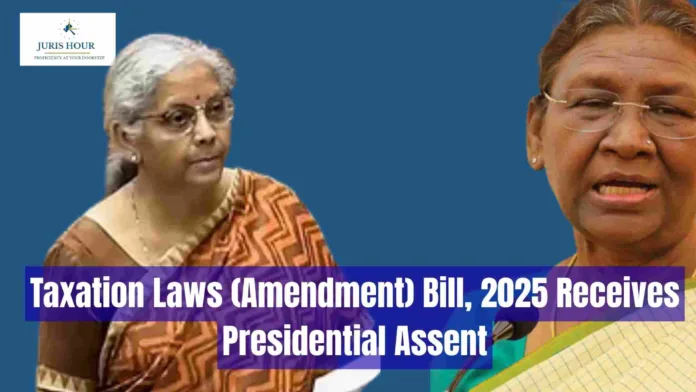India has officially entered a new era of direct taxation with President Droupadi Murmu giving her assent to the The Taxation Laws (Amendment) Bill, 2025, by amending the the Income-Tax Act, 1961 and the Finance Act, 2025.

The Taxation Laws (Amendment) Bill, 2025 was introduced in Lok Sabha on August 11, 2025. The Bill seeks to amend the Income-Tax Act, 1961 and the Finance Act, 2025. The 1961 Act provides for the framework to levy income tax on individuals and companies. The 2025 Act gives effect to the tax proposals of central government for the financial year 2025-26.
Exemptions for the Unified Pension Scheme: The 1961 Act specifies income categories which are exempt from income tax. These include any payments by the National Pension System Trust to an assessee on account closure or opting out of the scheme. The exemption applies to up to 60% of the total amount payable in such cases. The Bill adds exemptions for: (i) payments under the Unified Pension Scheme (UPS) upon superannuation, voluntary retirement, or retirement (up to 60% of the pension corpus), and (ii) lump sum amounts received under UPS. UPS has been introduced as an alternative pension scheme for central government employees from the financial year 2025-26.
Under UPS, the accumulated corpus consists of: (i) an individual corpus with the contributions by an employee and matching contributions by the central government, and (ii) a pool corpus with additional contributions by the central government. The Bill specifies that transfers from individual corpus to pool corpus will not be treated as income and will not be taxed. This applies to such transfers upon superannuation, voluntary retirement, or retirement.
Exemptions for the Public Investment Fund of Saudi Arabia: The Act provides for tax exemptions on certain income from investments made in India by: (i) a wholly owned subsidiary of the Abu Dhabi Investment Authority, which is a resident of UAE, and invests funds owned by the Abu Dhabi government, (ii) a sovereign wealth fund that is wholly owned, controlled, and regulated by a foreign government with no benefit to private persons, and (iii) a pension fund that is created under the law of a foreign country, and is exempt from tax or not taxed in that country. The Bill extends this exemption to income from investments made by: (i) the Public Investment Fund of the Government of Saudi Arabia, and (ii) its wholly owned subsidiary, which is a resident of Saudi Arabia, and invests funds owned by the government of Saudi Arabia.
Block assessment in search cases: The 1961 Act specifies a procedure for the assessment of total undisclosed income as a result of a search. It provides for assessment for a block period. The block period refers to the six assessment years preceding the year in which a search took place. It also includes the part of the current year up to the date of the search initiation. The Act states that if a tax assessment, reassessment or recomputation for any year in the block period is pending, the assessment will stop on the date of initiation of the search or making of requisition. The Bill adds that if a notice for such an assessment is issued after a search has begun but before the search is completed, that assessment will stop on the date of the notice. This will not apply to the assessment year in which the last search authorisation or requisition is made.
A significant debate surrounding the new law has been the exclusion of Cost Accountants from the definition of “Accountant.” The Institute of Cost Accountants of India (ICMAI) expressed strong disappointment over this move, calling it “deeply disheartening.” The Select Committee of Parliament, however, defended its recommendation to restrict the definition to Chartered Accountants, arguing that tax audits fall exclusively within their professional domain, while cost audits remain within the domain of CMAs.
Another contentious provision is Clause 381, which introduces the framework for the Board for Advance Rulings (BAR). Under this clause, the Central Government may constitute one or more such Boards through notification. Each Board will comprise two senior officers not below the rank of Chief Commissioner, tasked with providing advance rulings on tax matters.

